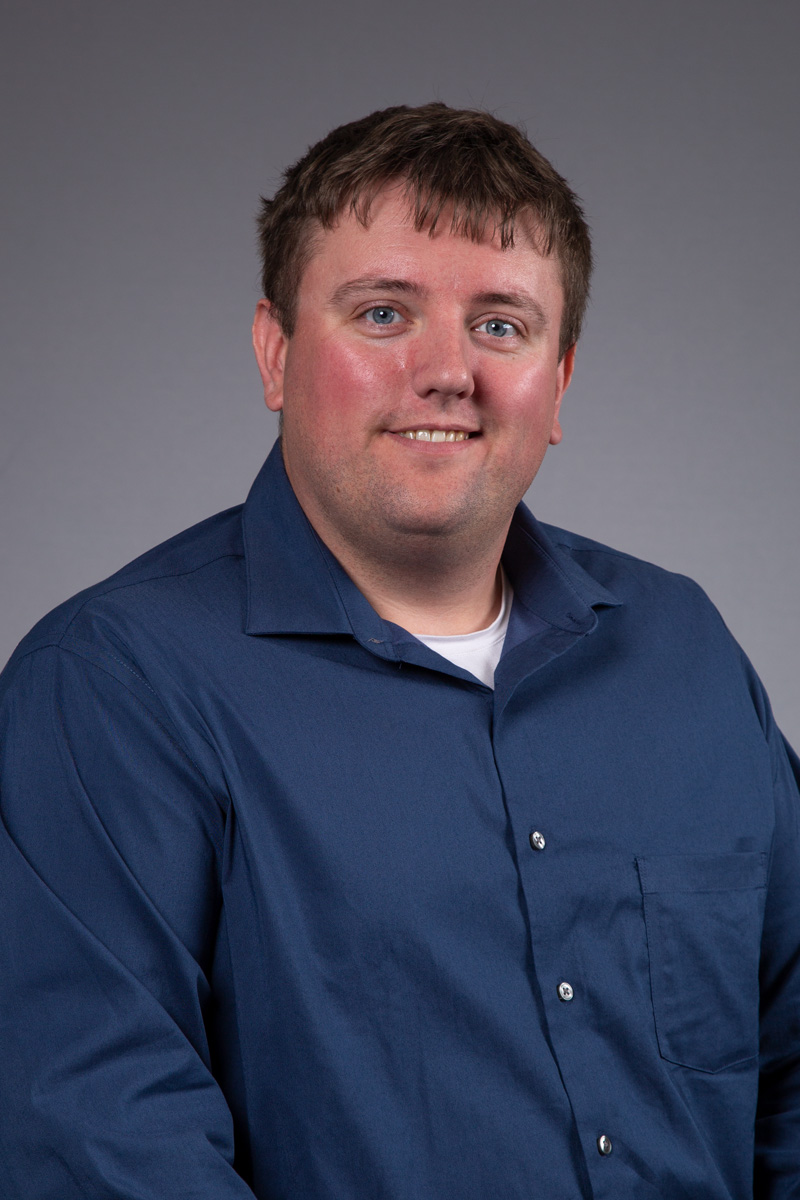New extension forage specialist brings life-long interest to Cooperative Extension Service
April 5, 2024
By Ryan McGeeney
U of A System Division of Agriculture
Fast Facts:
- Kubesch grew up helping on family farm
- Will develop forage, livestock curricula for extension agents
(667 words)
(Newsrooms: With portrait of Kubesch)
LITTLE ROCK — It began, as it sometimes does, with elephants.
Jonathan Kubesch, extension forage specialist for the University of Arkansas System Division of Agriculture, spent a fair amount of his childhood working on his grandparents’ farm near Peru, Indiana. In addition to raising Angus cattle and growing beans and corn, they also grew vast swaths of alfalfa.
“They’d sell alfalfa hay to circuses for elephants,” Kubesch said. “There’s a picture of me as a 4-year-old on an elephant somewhere.
“That’s a good way to get some skin in the game,” he said. “To learn what it takes to grow forages, what it takes to support a livestock operation.”
Kubesch joined the Cooperative Extension Service, the outreach and education arm of the Division of Agriculture, in late March. After completing his Ph.D. in crop and soil environmental science at Virginia Tech, he spent several months writing curriculum on forage and grassland for the state of Virginia educational system before coming to Arkansas.
Kubesch described his research experience, from his undergraduate work at The Ohio State University and his graduate work at the University of Tennessee, Knoxville, as well as that at Virginia Tech as ranging from “the applied to the pie-in-the-sky.”
“At Ohio State, I did some work trying to use native clovers to see if they might have a forage role — give a native plant a job,” he said. “In Tennessee, I was trying to find the most efficient way to transition forage systems to organic production, trying to get a value-add for certified organic. At Virginia Tech, I was working on ‘bee-friendly beef,’ adding wildflowers to pastures to get around fescue toxicosis and also to feed bees and other pollinators.
“But the big thing is this: How do we get the most value out of these forage systems and do things that make the world a better place?” he said.
When the forage specialist position with the Division of Agriculture became available, it was nearly a perfect fit for Kubesch and his wife, Sarah Grace.
“The job came up on my radar, and I was heavily encouraged to apply” by his supervisor at Virginia Tech. It didn’t hurt that Kubesch’s wife has family in Sevier County, he said.
“We were looking to get closer to family as well,” Kubesch said. “Arkansas was on our radar as a place we wanted to end up.”
The Kubesch family includes a 7-month-old son, Joseph Cole Kubesch.
“He started crawling the moment he got to Little Rock,” Kubesch said. “I think he knew he wanted to be a Hog.”
Kubesch and his family live on about six acres of land near Hensley, south of Little Rock. He said he plans to begin raising ducks and turkeys, along with the forages to feed them.
“Maybe practice a little bit of what I preach out there,” he said.
Michael Looper, head of animal science for the Division of Agriculture, said Kubesch’s duties will include providing training, collaboration and support to county extension agents and their programs. He will also “develop and implement science-based educational outreach programs to increase producer knowledge and understanding of efficient utilization of forages to improve the profitability of livestock production,” Looper said. This will include harvested forages and grazing systems as well as forage adaptation, establishment and management.
“We are very excited for Jonathan to join the Extension Animal Science family,” Looper said. “With Jonathan’s expertise and formal training in forages, his enthusiasm for ‘all things forages’ complements our already existing beef, small ruminant and equine programs.”
“I think the big thing I’m interested in is trying to figure out ways to make the science match the producers’ needs,” Kubesch said. “What are the standards of success? What forage options are most reliable? How can we make the system more resilient to climate changes, labor availability, and so on.
“I want to really take those producer questions, fail on a few square feet in research trials, and come back with answers,” he said. “I think that’s especially important.”
To learn about extension programs in Arkansas, contact your local Cooperative Extension Service agent or visit www.uaex.uada.edu. Follow us on X and Instagram at @AR_Extension. To learn more about Division of Agriculture research, visit the Arkansas Agricultural Experiment Station website: https://aaes.uada.edu/. Follow on X at @ArkAgResearch. To learn more about the Division of Agriculture, visit https://uada.edu/. Follow us on X at @AgInArk.
About the Division of Agriculture
The University of Arkansas System Division of Agriculture’s mission is to strengthen agriculture, communities, and families by connecting trusted research to the adoption of best practices. Through the Agricultural Experiment Station and the Cooperative Extension Service, the Division of Agriculture conducts research and extension work within the nation’s historic land grant education system.
The Division of Agriculture is one of 20 entities within the University of Arkansas System. It has offices in all 75 counties in Arkansas and faculty on five system campuses.
The University of Arkansas System Division of Agriculture offers all its Extension and Research programs to all eligible persons without regard to race, color, sex, gender identity, sexual orientation, national origin, religion, age, disability, marital or veteran status, genetic information, or any other legally protected status, and is an Affirmative Action/Equal Opportunity Employer.
# # #
Media Contact:
Ryan McGeeney
rmcgeeney@uada.edu
@Ryan_McG44
501-671-2120
